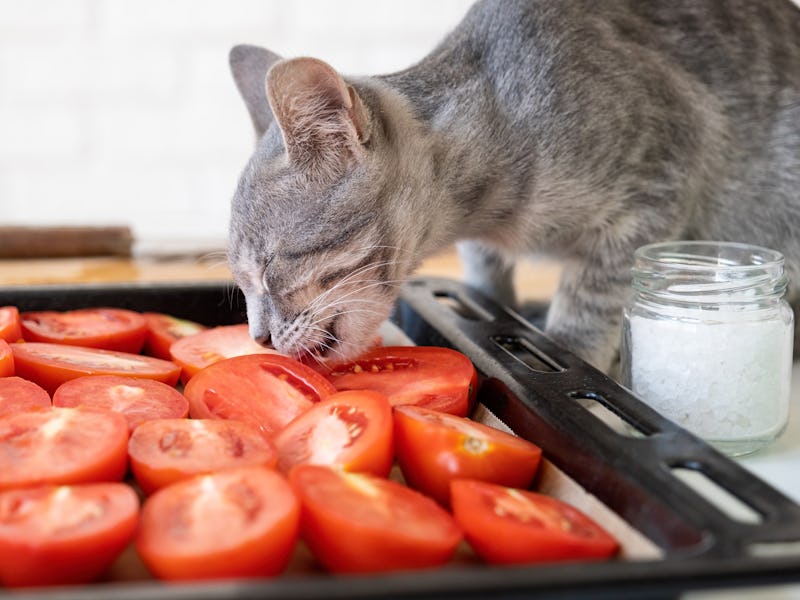Can My Cat Eat A Plant-Based, Vegan Diet? The Answer Will Surprise You
Cats are obligate carnivores, but that’s not the whole story.

If you’re a cat owner, you know that cats love meat. Search any pet food store and there’s no shortage of fish, chicken, or beef-flavored options. In fact, as apex predators, cats naturally thrive on a meat-based diet. But is it possible for our feline friends to go plant-based? Better yet, are there any advantages to being a cat on a vegan diet?
Do Cats Need Meat?
Cats are obligate carnivores. That means that they can’t derive all their essential nutrients from plants.
“Because they have a fairly precise, consistent diet, they've lost some ability to consume and utilize vegetable material,” Richard Hill, a veterinary nutrition professor at the University of Florida College of Veterinary Medicine tells Inverse. In other words, cats and their ancestors have hunted exclusively for so long that they’ve lost key enzymes and other proteins and key compounds that enable them to acquire all the nutrients and vitamins they need from plants.
For example, cats lack the enzyme that converts beta-carotene, found in plants, to vitamin A, which is a necessary nutrient cats need. So they must get their entire supply of vitamin A from animal protein; vitamin A is abundant in fish and organ meat. Another chief nutrient that cats can’t get from plants is the amino acid taurine, which is an essential nutrient for felines.
Can my cat be vegan?
Ultimately, it’s not impossible to turn your cat vegan, but it would involve plenty of formulating, according to Hill. There are ways to develop a food with all these nutrients added, but it must be done correctly. The wrong proportion of ingredients could result in illness.
For example, cats are best built for protein and fat. While they can process cooked starch, too many carbohydrates and fiber can cause diarrhea.
There are few studies that have adequately demonstrated the effects of a plant-based diet in cats versus an omnivorous one. One 2023 study published in the journal PLoS ONE looked at health outcomes in over 1,300 cats fed either a meat-based or vegan diet for at least a year. However, only 127 cats ate a vegan diet, making for a small and imbalanced sample size compared to the carnivorous group.
Are there benefits to a vegan diet for cats?
There’s some evidence that a plant-based pet diet could have beneficial effects on the environment. One 2023 study also published in PLoS ONE concluded that the benefits from such a transition would be “substantial.” However, this would have to be a universally accepted switch estimated to include at least 61 million cats in the U.S. and would require many more studies to ensure this would be healthy to do so. Even if this diet is feasible for cats, Hill isn’t convinced that it comes with more health benefits. “The only reason for doing it is for the philosophic reason,” he says.
Though Hill says there’s no reason not to try a plant-based diet, he advises that cat owners stick to commercially available vegan cat food that’s marked as a complete and balanced diet. Another 2023 study in the journal Veterinary Sciences on plant-based diets in cats recommends the same. He highly discourages pet parents from creating their own food. “Only people who really know what they're doing should do this,” he says. “You have to be sure what you're doing and it's easy to make mistakes.”